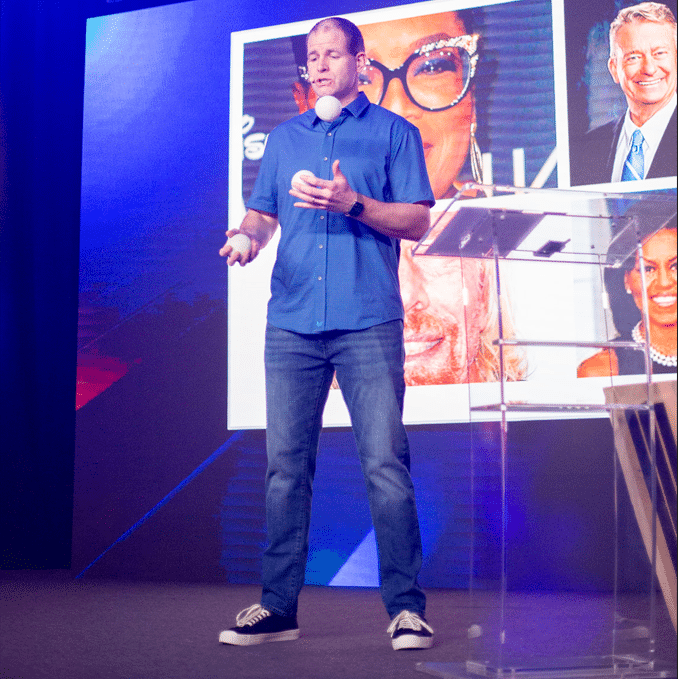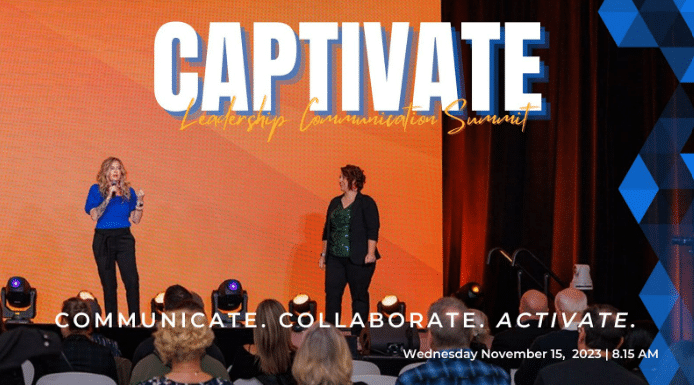Public speaking anxiety is a universal hurdle that even the most accomplished leaders encounter. The fear of judgment and the spotlight can trigger a primal response, rooted in our evolutionary history. This fear often leads us to avoid eye contact and disconnect from our audience. However, a profound remedy lies in the principles of improvisation. By shifting the focus away from ourselves and towards the audience, we can unravel the knots of anxiety and emerge as confident and impactful leaders. In this article, we will explore how leaders can conquer public speaking anxiety by integrating insights from improvisational techniques.
Rewiring Our Instinctual Anxiety
Our public speaking anxiety can be traced back to our evolutionary roots when being watched was linked to survival. Ancient humans perceived unfamiliar eyes as potential threats, triggering the fight-or-flight response. Today, these instincts translate into the overwhelming anxiety of being in the spotlight. This connection is hardwired in our brains, making it crucial to find innovative approaches to rewire this deep-seated fear.
A Roadmap to Overcoming Public Speaking Anxiety
The key to conquering public speaking anxiety lies in shifting our focus outward. Often overlooked, generosity becomes a powerful tool to calm the fear center of our brain. Studies reveal that acts of kindness activate the vagus nerve, which minimizes nervousness and enhances our impact.
Here’s how to overcome public speaking anxiety using generosity:
- Audience-Centric Preparation: Instead of focusing solely on the topic, understand your audience’s needs and expectations. Tailor your message to create a meaningful connection.
- Pre-Speech Reframing: Before stepping onto the stage, rewire your brain’s response. Remind yourself that your goal is to help the audience. Consistently practicing this approach gradually reduces anxiety.
- Authentic Eye Contact: Combat anxiety by engaging in genuine eye contact. Focus on connecting with one person at a time to foster a connection and decrease unease.
- Extending Generosity: Extend generosity to visual engagement. Include those at the edges of the room to create inclusivity, bridging the gap between speaker and audience.
- Embrace Confidence: Generosity transforms both the audience and the speaker. Embracing giving and connecting allows us to speak with confidence and authenticity, leaving a lasting impact.
How Improv Insights Help in Overcoming Public Speaking Anxiety for Leaders
In the quest to conquer public speaking anxiety, leaders can draw inspiration from the world of improvisation. Just as improv actors thrive on spontaneity and collaboration, leaders can benefit from incorporating improv insights into their speaking strategies.
Here's how these insights align with the journey of overcoming public speaking anxiety:
Embracing “Yes, And…” for Adaptability: The improv principle “Yes, And…” urges actors to build on each other’s contributions. Applied to public speaking, it fosters openness and adaptability by turning unexpected disruptions into opportunities to enhance the message, reducing anxiety and enhancing flexibility.
Creating Collaborative Engagement: Drawing from the heart of improv’s collaborative spirit, this approach invites the audience into dynamic conversations during public speaking. By empathetically responding to audience reactions and adjusting delivery, leaders build connections that counter anxiety and cultivate engagement, transforming speeches into interactive exchanges.
Transforming Mistakes into Growth: Just as improv values mistakes, leaders can reframe errors in speeches as chances for growth. Acknowledging slip-ups with humor showcases authenticity and relatability, alleviating pressure and endearing leaders to the audience. Treating mistakes as stepping stones diminishes anxiety and amplifies the speaker’s credibility.
Trusting the Process for Confident Delivery: Echoing improv’s trust in instincts, public speaking success lies in audience-centric preparation and genuine connections. By focusing on connecting rather than impressing, leaders shift from self-doubt to confident authenticity, creating impactful and purposeful deliveries.
Celebrating Vulnerability for Relatable Impact: Vulnerability, key to improv, becomes a tool in public speaking through authentic storytelling. This approach bridges the gap between speaker and listener, diminishing anxiety as genuine connections grow, deepening the message’s impact.
Adapting and Thriving through Resilience: Emulating improv’s adaptability, leaders embrace real-time adjustments in public speaking. Openness to audience cues allows for seamless pivots, showcasing agility, easing anxiety, and ensuring a resilient and effective delivery.
Conclusion
Incorporating insights from improvisation into the journey of overcoming public speaking anxiety can be transformative for leaders. By embracing spontaneity, collaboration, resilience, and authenticity, leaders can navigate the challenges of public speaking with newfound confidence. Just as improv actors thrive on uncertainty and turn it into creativity, leaders can turn their anxiety into a catalyst for impactful communication.
So, let the stage become your playground, and let improv insights guide you toward mastering the art of fearless public speaking.
Join us at CAPTIVATE-Leadership Communication Summit on November, where industry experts and seasoned speakers will share invaluable insights and strategies to help you excel in every speaking engagement. Don’t miss this opportunity to transform your leadership journey – reserve your spot today and take the first step towards becoming a confident and influential communicator.


